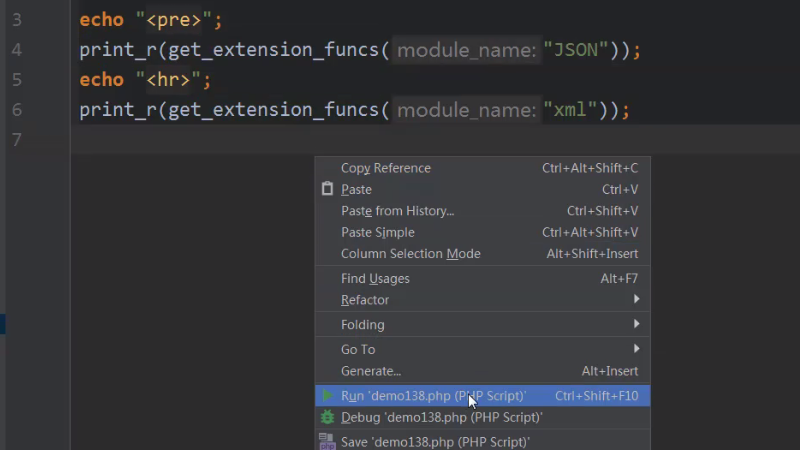How to get the function name of a module in PHP
PHP obtains the function name of the module, which can be achieved through the get_extension_funcs function. Such as searching XML, JSON functions.

Let’s use code examples to introduce how to get module function names in PHP.
The code example is as follows:
<?php
echo "<pre class="brush:php;toolbar:false">";
print_r(get_extension_funcs("JSON"));
echo "<br>";
print_r(get_extension_funcs("XML"))."\n";The output result is as follows:
Array
(
[0] => json_encode
[1] => json_decode
[2] => json_last_error
[3] => json_last_error_msg
)
Array
(
[0] => xml_parser_create
[1] => xml_parser_create_ns
[2] => xml_set_object
[3] => xml_set_element_handler
[4] => xml_set_character_data_handler
[5] => xml_set_processing_instruction_handler
[6] => xml_set_default_handler
[7] => xml_set_unparsed_entity_decl_handler
[8] => xml_set_notation_decl_handler
[9] => xml_set_external_entity_ref_handler
[10] => xml_set_start_namespace_decl_handler
[11] => xml_set_end_namespace_decl_handler
[12] => xml_parse
[13] => xml_parse_into_struct
[14] => xml_get_error_code
[15] => xml_error_string
[16] => xml_get_current_line_number
[17] => xml_get_current_column_number
[18] => xml_get_current_byte_index
[19] => xml_parser_free
[20] => xml_parser_set_option
[21] => xml_parser_get_option
[22] => utf8_encode
[23] => utf8_decode
)Function introduction:
get_extension_funcs() function , returns an array of module function names.
array get_extension_funcs ( string $module_name )
This function returns the names of all functions defined within the module based on module_name.
The parameter module_name is the module name.
Note: This parameter must be lowercase (lowercase).
Return value, returns an array containing all function names, or returns FALSE if module_name is not a valid extension.
This article is an introduction to how to obtain the module function name in PHP. It is simple and easy to understand. I hope it will be helpful to friends in need!
The above is the detailed content of How to get the function name of a module in PHP. For more information, please follow other related articles on the PHP Chinese website!

Hot AI Tools

Undresser.AI Undress
AI-powered app for creating realistic nude photos

AI Clothes Remover
Online AI tool for removing clothes from photos.

Undress AI Tool
Undress images for free

Clothoff.io
AI clothes remover

AI Hentai Generator
Generate AI Hentai for free.

Hot Article

Hot Tools

Notepad++7.3.1
Easy-to-use and free code editor

SublimeText3 Chinese version
Chinese version, very easy to use

Zend Studio 13.0.1
Powerful PHP integrated development environment

Dreamweaver CS6
Visual web development tools

SublimeText3 Mac version
God-level code editing software (SublimeText3)

Hot Topics
 1386
1386
 52
52


